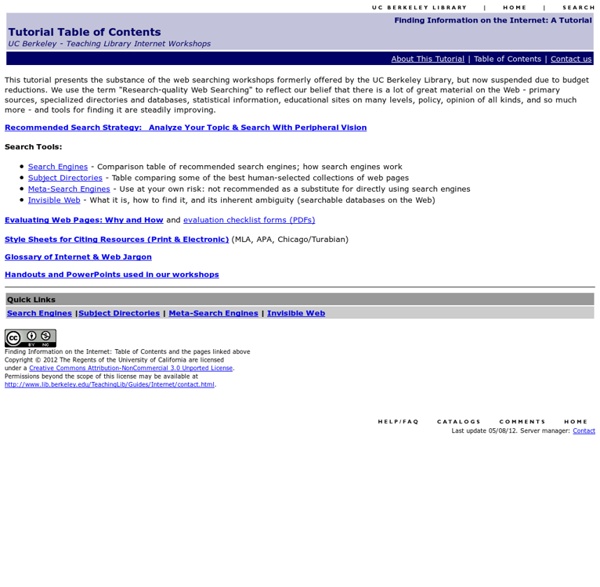



http://www.lib.berkeley.edu/TeachingLib/Guides/Internet/FindInfo.html
Related: Search SkillsSkills for Online Searching - ipl2 A+ Research & Writing Learn how search syntax works Search syntax is a set of rules describing how users can query the database being searched. Sophisticated syntax makes for a better search, one where the items retrieved are mostly relevant to the searcher's need and important items are not missed. It allows a user to look for combinations of terms, exclude other terms, look for various forms of a word, include synonyms, search for phrases rather than single words. Deep Web From Wikipedia, the free encyclopedia (Redirected from Deep Web) Deep Web may refer to: Live Training – Search Education – Google With these webinars, you can improve your own search skills and learn how to bring search literacy to your school. Browse the archive of past trainings, and make sure to follow us on Google+ to stay up to speed on the latest tips and trainings from Google. Even better search results: Getting to know Google search for education
Deep Web Research 2012 Bots, Blogs and News Aggregators ( is a keynote presentation that I have been delivering over the last several years, and much of my information comes from the extensive research that I have completed over the years into the "invisible" or what I like to call the "deep" web. The Deep Web covers somewhere in the vicinity of 1 trillion plus pages of information located through the world wide web in various files and formats that the current search engines on the Internet either cannot find or have difficulty accessing. The current search engines find hundreds of billions of pages at the present time of this writing. In the last several years, some of the more comprehensive search engines have written algorithms to search the deeper portions of the world wide web by attempting to find files such as .pdf, .doc, .xls, ppt, .ps. and others. This Deep Web Research 2012 report and guide is divided into the following sections: 99 Resources to Research & Mine the Invisible Web by Jessica Hupp
Dark Internet Causes[edit] Failures within the allocation of Internet resources due to the Internet's chaotic tendencies of growth and decay are a leading cause of dark address formation. One form of dark address is military sites on the archaic MILNET. These government networks are sometimes as old as the original ARPANET, and have simply not been incorporated into the Internet's evolving architecture. See also[edit]
11 Unknown Ways Of Using Google Search - Curious Mob Thinking what more is there to know about Google search? I mean its Google search after all, type whatever you want to search, press enter and everything in the world related to your topic is displayed in front of your eyes. But believe it or not the search engine has plenty of tricks up its sleeve. Here’s an overview of 11 Google Tricks That Will Change the Way You Search: 11. Use quotes to search for an exact phrase Verification Handbook for Investigative Reporting Craig Silverman is the founder of Emergent, a real-time rumor tracker and debunker. He was a fellow with the Tow Center for Digital Journalism at Columbia University, and is a leading expert on media errors, accuracy and verification. Craig is also the founder and editor of Regret the Error, a blog about media accuracy and the discipline of verification that is now a part of the Poynter Institute.
The University of South Carolina Beaufort So, you're still getting those 1,670,000+ responses to your search queries on the Web, and you're still too busy to do anything about it, like reading the lengthy, and sometimes confusing, "help" screens to find out how to improve your searching techniques. Look no further! Real help is here, in the USCB Library's BARE BONES Tutorial.
How to search like a spy: Google's secret hacks revealed The National Security Agency just declassified a hefty 643-page research manual called Untangling the Web: A Guide to Internet Research (PDF) that, at least at first, doesn't appear all that interesting. That is, except for one section on page 73: "Google Hacking." "Say you're a cyberspy for the NSA and you want sensitive inside information on companies in South Africa," explains Kim Zetter at Wired. "What do you do?" Well, you could type the following advanced search into Google — "filetype:xls site:za confidential" — to uncover a trove of seemingly private spreadsheets. How about an Excel file containing Russian passwords?
How to Properly Research Online (and Not Embarrass Yourself with the Results) Warning: if you are going to argue a point about politics, medicine, animal care, or gun control, then you better take the time to make your argument legit. Spending 10 seconds with Google and copy-pasting wikipedia links doesn't cut it. The standard for an intelligent argument is